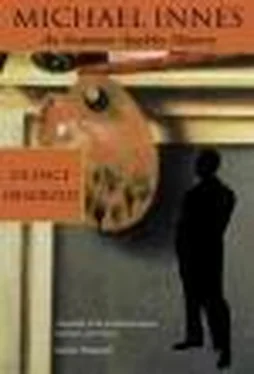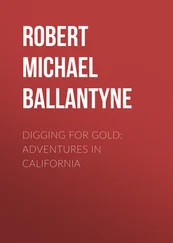Michael Innes - Lament for a Maker
Здесь есть возможность читать онлайн «Michael Innes - Lament for a Maker» весь текст электронной книги совершенно бесплатно (целиком полную версию без сокращений). В некоторых случаях можно слушать аудио, скачать через торрент в формате fb2 и присутствует краткое содержание. Жанр: Старинная литература, на английском языке. Описание произведения, (предисловие) а так же отзывы посетителей доступны на портале библиотеки ЛибКат.
- Название:Lament for a Maker
- Автор:
- Жанр:
- Год:неизвестен
- ISBN:нет данных
- Рейтинг книги:4 / 5. Голосов: 1
-
Избранное:Добавить в избранное
- Отзывы:
-
Ваша оценка:
- 80
- 1
- 2
- 3
- 4
- 5
Lament for a Maker: краткое содержание, описание и аннотация
Предлагаем к чтению аннотацию, описание, краткое содержание или предисловие (зависит от того, что написал сам автор книги «Lament for a Maker»). Если вы не нашли необходимую информацию о книге — напишите в комментариях, мы постараемся отыскать её.
Lament for a Maker — читать онлайн бесплатно полную книгу (весь текст) целиком
Ниже представлен текст книги, разбитый по страницам. Система сохранения места последней прочитанной страницы, позволяет с удобством читать онлайн бесплатно книгу «Lament for a Maker», без необходимости каждый раз заново искать на чём Вы остановились. Поставьте закладку, и сможете в любой момент перейти на страницу, на которой закончили чтение.
Интервал:
Закладка:
‘They are bound to figure sometimes in both. But we are far from having exhausted the network of motive yet – nor have we all the materials. Somewhere there is a strong motive of fear, horror, hatred against Neil Lindsay, whose destruction was worked with such diabolical skill into the greatest of all the jigsaws. That we must investigate. What is clear so far is the whole picture in relation to Ian. You can think of much that fits in. The passionate shutting-up of this gallery, for instance, when Ranald inherited.’ I let my torch circle the portraits on the wall. ‘The Guthries of Erchany! The tradition Ranald had betrayed. A wild, dark lot they may have been. But fratricide, of which Ranald had virtually been guilty in the bush, was outside the family scope.’
Wedderburn nodded. ‘According to my friend Clanclacket they were distinguished for sticking together.’
‘And then the passion of impatience at the opening-up of the gallery. He had got his idea and he must see the family portraits again to assure himself of its feasibility; to reassure him that Guthries really have the strange characteristic, occasionally observable in old families, of being remarkably like each other.’
Gylby broke in. ‘That’s the point where I can’t see–’
‘Listen.’ I fished from my pocket Gylby’s own journal letter and turned the pages. ‘It is, as you remarked, rather literary; but it gives the essence.’ And I read:
‘Guthrie in his dust had returned to innocence; that sinister face, with the strongly marked features that speak of race, was stronger and purer, as if some artist had taken a sponge and swabbed the baser lines away. One reads of death showing such effects; to encounter them at such a violent issue was disconcertingly moving. I composed the body as I could…
One reads of death showing such effects . You see how nicely Ranald had calculated? Actually you were looking at a different man. But what you thought you saw was the transfiguring effect of death – a well-known and authentic thing. Death commonly does just that: makes a man look slightly different, takes away lines of pressure and anxiety so that an impression of ease or peacefulness or innocence results. Death, in fact, would turn brother Ranald into brother Ian. Conversely, Ian dead and spontaneously thought of as Ranald would certainly seem Ranald – touched by death . And remember that neither you nor Miss Guthrie ever saw the living Ranald in a good light. On the night of your arrival there was nothing but an ungenerous candle-light. And on the following day Guthrie took care not to appear. You see how, appearing like a bolt from the blue, you were yet fitted instantaneously into the jigsaw. The body was to be formally identified by Hardcastle who was in the know, by Mrs Hardcastle who is half-blind and by Dr Noble who hadn’t seen Ranald Guthrie for two years. The Gamleys had been sent away and Gamley’s coming into the picture at all was an unforeseen mischance. But Gamley saw the body only by lantern-light and suspected nothing. Miss Mathers, the one person who would have seen at once that the dead man was not Ranald, was on her way to Canada and unlikely to be found in time for the merely formal identification which alone would be thought of. At the same time Miss Mathers’ absence was part of the plan for incriminating Lindsay. And – as I say – you and Miss Guthrie, who might have been such an awkward irruption on the scheme, were brilliantly utilized to give, imperceptibly, further weight to the assumption that the dead man was Ranald. Ranald operated with superb economy, using everything that turned up, from a legend about chopped fingers to an unexpected kinswoman. Indeed he found you useful, Miss Guthrie, in more ways than one.’
Sybil Guthrie looked absently into the gloom of the gallery. ‘I frightfully confused the issues,’ she said.
‘No, I don’t mean your story of events in the tower, we’ll come to that. I mean that Ranald found your conversation useful.’
Miss Guthrie opened round eyes.
‘We all see, I think, what Ranald was aiming at for himself. ‘ Oh my America, my new found land .’ His early experience as an actor. His making a rapid study of general medicine. His leading you to talk of America as far back as you could remember, the America in which Richard Flinders had worked. All these things show us clearly what Ranald was intending to do – I should say what he is intending to do. Richard Flinders has died as Ranald Guthrie: Ranald Guthrie is going to live as Richard Flinders – a Richard Flinders who is retiring both from medical research and from the society in which he has lived for the last twenty years, who is going to live quietly in California on a pension. It is, as Ian was going to tell us when he had to break off writing, a feasible, a realizable end. And notice here again a strong appeal, a strong motive, on the symbolical level. Compare the lives of the two brothers and it is clear than Ian won . Ian had always been, he himself tells us, “the rudely healthy member of the family.” Ranald, on the other hand, was a “neurotic personality.” And subsequently–’
‘Ian,’ Wedderburn interrupted unexpectedly, ‘was packed off abroad because he was too successful with the young women; Ranald, because he had run away to a profession that consists in hiding from oneself by dressing up as somebody else.’
‘A capital psychologist’s point. And subsequently this position – the proposition, simply, of Ranald’s inferiority – is exacerbated. Ian saves Ranald’s life: Ranald betrays Ian’s. Later still Ian as Richard Flinders rises to eminence in a beneficent career: Ranald’s life is futile and increasingly neurotic. But now Ranald becomes Ian! The unsuccessful brother succeeds both in identifying himself with his successful rival and in displacing him.’
Wedderburn took a turn up and down the gallery. ‘Mr Appleby, it is all perfectly coherent. How strange, then, that motives of this sort are almost unknown to criminal law.’
It is because these profound motives are always – except in the case of madmen – rationalized. There is always a topdressing, so to speak, of motive comprehensible not to the deeply passional but to the romantic or economic man. And it is with these super-imposed motives that we deal in the police courts. There is such a further motive here, in a direction we have not yet explored.’ In my turn I paced up and down the gallery. ‘And yet I don’t know that this further motive is really a superficial one. Perhaps it is the master motive of all.’
Noel Gylby searched his pockets for absent cigarettes; discovered instead his store of buttered biscuits. He handed them round. ‘Motives,’ he said vaguely, ‘to right of us, motives to – sorry: go on.’
‘Take another significant point in Guthrie’s behaviour – and one in which we see him nearest to real madness; in which we see him at his most patently pathological point. He could impersonate Flinders. He could get up the America Flinders had known. He could get up enough medicine to protect himself in the event of any unforeseen intrusion on his privacy by medical people. But there was one big difficulty. The Californian Flinders must not display any marked character-trait which it might become known was quite alien to the Sydney Flinders. And Ranald Guthrie had such a trait – more than a trait, indeed. He had a stubborn and strange and glaring compulsion. He was a pathological miser. If he were to become Flinders he had the tremendous task of conquering that.’
‘Surely the impossible task?’ It was Sybil Guthrie who spoke. ‘Almost certainly the impossible task. But that his will would refuse to acknowledge. We know that he made efforts – and the grotesque nature of the early results give the measure of his task. He thought of his table and ordered up wine and laid in caviare. But he neglected to stop starving his dogs.’
Читать дальшеИнтервал:
Закладка:
Похожие книги на «Lament for a Maker»
Представляем Вашему вниманию похожие книги на «Lament for a Maker» списком для выбора. Мы отобрали схожую по названию и смыслу литературу в надежде предоставить читателям больше вариантов отыскать новые, интересные, ещё непрочитанные произведения.
Обсуждение, отзывы о книге «Lament for a Maker» и просто собственные мнения читателей. Оставьте ваши комментарии, напишите, что Вы думаете о произведении, его смысле или главных героях. Укажите что конкретно понравилось, а что нет, и почему Вы так считаете.











